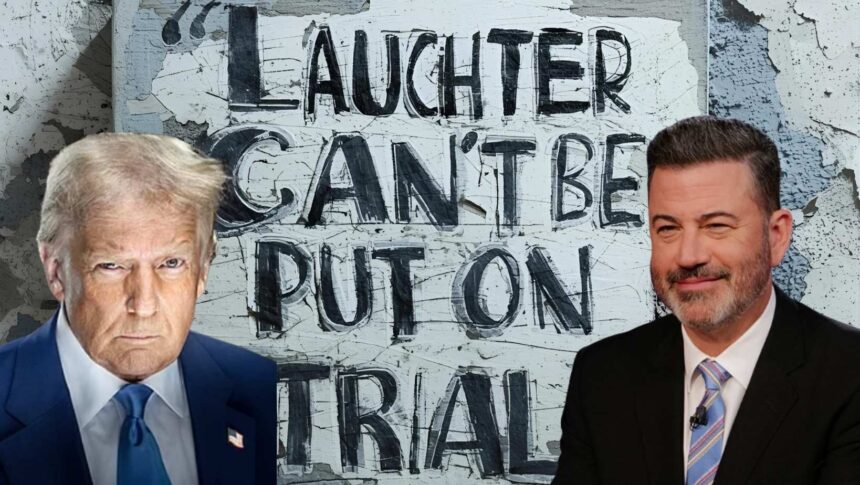Donald Trump’s running feud with Jimmy Kimmel is not just another celebrity spat. It is a struggle over who gets to define reality on America’s biggest stages, and whether the punchline can puncture a political brand built on dominance.
That is why a late-night monologue drew more than 6 million broadcast viewers, a 10-year high for “Jimmy Kimmel Live!,” and nearly 26 million social views, even as dozens of stations initially refused to air it, setting off a days-long fight over regulation and retribution that no network could ignore.
Kimmel’s return followed a brief suspension after remarks tied to the killing of conservative activist Charlie Kirk.
In his comeback monologue, he thanked supporters across the spectrum and read out Trump’s insults, then turned them into a ratings bit. The episode landed because humor does what courtroom filings and press conferences do not.
It makes the powerful look small, and it travels fast across platforms where the presidency and pop culture collide.
ABC’s claim of a decade-best audience, paired with the social numbers, underscores the commercial reality that controversy still converts to reach when the content resonates.
Trump, for his part, reacted in familiar fashion, he blasted Disney and ABC online and hinted at testing legal theories that would treat jokes as illicit campaign support, vowing to “test ABC out on this.”
Threats of regulatory heat followed as the Federal Communications Commission’s chair publicly weighed consequences for broadcasters.
That posture alarmed not only Democrats but also prominent Republicans who warned against government refereeing of televised speech, a rare moment when free expression trumped tribal loyalties.
Trump’s willingness to escalate personal disputes has also surfaced in economic debates, as seen in his renewed clash with Federal Reserve Chair Jerome Powell in Trump’s Viral Cartoon Revives Clash Over Interest Rates.
The affiliates’ revolt showed the risk calculus for local owners. Nexstar and Sinclair initially preempted Kimmel in markets that together account for roughly a quarter of U.S. households, citing community standards and propriety.
By week’s end both groups reversed course and restored the show, a reminder that prolonged blackouts carry their own costs in ratings, ad commitments, and tense negotiations with a network partner that still controls must-have programming across the schedule.
Their reversal came without public evidence of editorial concessions from Disney, which mattered for creators and advertisers tracking whether corporate speech would bend to political pressure.
There is a deeper reason this clash keeps repeating, Trump understands as well as any modern politician that television is not merely a medium but a stage where authority is performed.
Mockery is kryptonite to that performance. When Kimmel read Trump’s Oscars critique live during the 2024 telecast and shot back, “Isn’t it past your jail time,” he broke the fourth wall in front of a global audience and demonstrated that celebrity ribbing can puncture the aura on which Trump has long traded.
The moment became part of the public record of their rivalry and a template for how satire can seize a news cycle.
The business stakes are plain: For Disney, a week that began with a pullback ended with a principled defense of its host and a ratings windfall, plus a clear message to talent that the company will not outsource editorial judgment to Washington.
For broadcasters dependent on federal approvals and spectrum licenses, the episode showed how quickly a programming dispute can become a regulatory headache.
For advertisers, it was a case study in brand safety in an environment where the boundary between politics and entertainment keeps dissolving.
And for investors who follow media conglomerates, it was a reminder that political risk can migrate from Washington to prime time and back, shaping corporate decisions with bottom-line implications even when no law has changed.
The culture stakes are just as clear, Comedians did not gain power to prosecute. They gained the freedom to puncture. Trump can sue newspapers or pressure regulators. He can flood the zone on his social platform.
What he cannot easily do is inoculate himself against laughter, especially when the joke lands in real time, on a broadcast network, before millions who then carry it to every feed that matters.
That asymmetry is why this fight keeps returning to the same stage, and why it matters beyond one week of late-night TV.
If you strip away the noise, the question is not whether Kimmel crossed a line or whether Trump will escalate again.
The question is whether the industry that profits from unscripted moments will defend the conditions that make them possible, even when the punchline targets the powerful, because in this business you can argue with the premise of a joke but you cannot put laughter on trial.




















